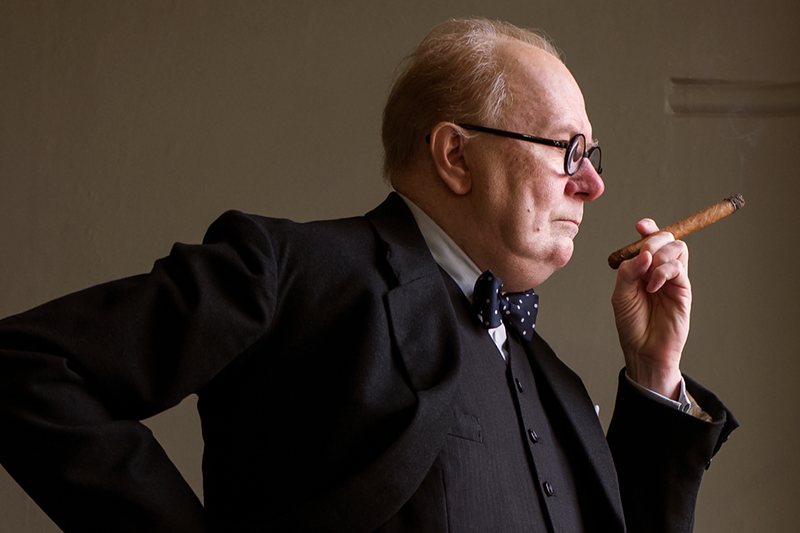
In comparison with Christopher Nolan’s Dunkirk, which covers much the same time frame but from a different perspective, Joe Wright’s Darkest Hour feels like a muted and quite routine effort. But it has a towering, memorable performance from Gary Oldman as Winston Churchill.
Wright walks us through the massive Dunkirk evacuation during the early days of World War II from the point of view of Britain’s newly appointed Prime Minister Churchill, a man with few allies in the government or the country at-large. The one steadfast person in his corner — his wife Clementine (Kristin Scott Thomas in graceful grand-dame mode) — seeks at every turn to remind her husband to be who he is.
Our first encounter with Churchill defines exactly how everyone else sees him, though. Young Elizabeth Layton (Lily James), a new secretary, receives hurried words of warning before being thrown into the great political lion’s den — or more literally, his bedchamber — as he starts his day dictating messages to world and party leaders. She’s required to listen attentively to the mumbled ramblings, stop on a dime as news requires him to adjust his messages and keep her head as he rages and roils like an active volcano. In effect, Elizabeth is a fevered and feverish newbie musician trying her best to hold steady with a master of improvisation. The fact that she initially fails adds her into the great huddled mass of humanity.
Everyone fears Churchill, including King George VI (Ben Mendelsohn), a most reluctant partner of the new prime minister. Churchill has taken over for former Prime Minister Neville Chamberlain (Ronald Pickup), seen as a Hitler appeaser, and simply won’t toe that same position. But no one in the kingdom believes that England is capable of standing up to the Nazis, so there are constant calls for brokering a “peace.” Churchill stands his ground, but over the course of the narrative we see the doubts that plague him at every step along the way.
As an overall cinematic experience, Wright’s film lacks the dazzle and spectacle of his Atonement (a film in which Dunkirk also figures) and Anna Karenina. Where is a scene comparable to the one in Atonement where James McAvoy’s character takes a harrowing journey across an extended World War II battlefield, a surreal and sad moment that still breaks my heart just thinking about it? It was on the basis of that extended sequence that I added Wright to a select group of filmmakers who knew how to use the technical craft to carry audiences into whatever emotional state the director wanted them to experience. Few filmmakers have that capability to let the camera be the absolute expression of whatever the director is seeing in his imagination.
Nonetheless, what makes Darkest Hour work as a gripping wartime drama is how Wright uses his quiet presence behind the camera to show viewers the people of Britain as they walk through the streets, whether with their heads down in the pouring rain or merely under dark and threatening clouds (indicators of literal and metaphoric storms on the horizon). This is a subtle use of his directorial power that is very effective.
Of course, he can afford to lie back since Oldman, in a gloriously old-school performance, shows us how a real leader comes to speak for and embody the will of his people. Oldman’s Churchill might, at first glance, appear to be a bully, but what becomes obvious is that Churchill is a man born and bred for greatness — a man who worked hard and planned and trusted his instincts, even in the face of opposition. To put it plainly, he is the epitome of someone who refused to suffer fools. But the moment of his ascension to power arrives at the worst possible time, as if fate and destiny combined to set him up for failure. And for the first time, he starts to question himself. In doing so, his humanity shines.
From the first early buzz, it was apparent that Oldman’s performance was one to be reckoned with. Despite working under layers of prosthetics, there is no way anyone could forget that they are watching him. Wright wisely hands the kingdom to Oldman, just like the British put their faith in Churchill. (Opens Friday.) (PG-13) Grade: B+

